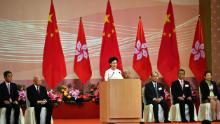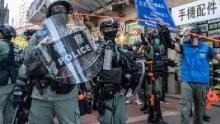Hong Kong (CNN)Hong Kong police on Wednesday made their first arrest under a controversial new national security law imposed by China's central government less than 24 hours ago, as protests broke out in the city.
The man arrested was holding a black flag carrying the words "Hong Kong independence," police said on Twitter.
On June 30, police commanders were told in a training session that anybody seen waving an independence flag or chanting for independence should be arrested, a police source said -- as should anyone found in possession of independence flags.
The national security law came into effect in Hong Kong in the lead-up to July 1 -- the 23rd anniversary of the handover of Hong Kong from British rule to China -- and dramatically broadens the powers of local and mainland authorities to investigate, prosecute and punish dissenters.
In vague language, the law criminalizes secession, subversion, terrorism, and collusion with foreign powers. People convicted of such crimes can face sentences of up to life in prison.
July 1 is traditionally a day of protests in the city but for the first time since handover, police did not give permission to protesters to hold peaceful demonstrations.
Despite the threat of stricter penalties and a heavy police presence, hundreds of people gathered in the city's busy shopping district of Causeway Bay on Wednesday to protest the new legislation, which critics say has stripped the city of its autonomy and precious civil and social freedoms, and cements Beijing's authoritarian rule over the territory.
Riot police fired pepper spray into the crowd at one point, and unfurled a purple flag warning protesters of being in violation of the new law.
On Wednesday, Hong Kong's top official, Chief Executive Carrie Lam, said the law is a "crucial step to ending chaos and violence that has occurred over the past few months" in the city.
"The national security law is the most important development in securing ties between China and the Hong Kong Special Administrative Region since the handover," she said, framing criticism of the law as "vicious attacks."
The stringent new legislation and its 66 articles were kept secret from the public until the law went into effect and appear to offer the government, courts, police and authorities a roadmap to quash any hint of the mass anti-government protests that rocked the city last year.
Here are some of the key takeaways of the law, according to a translation from Chinese state news agency Xinhua.
Reactions
The legislation has been widely criticized by opposition lawmakers in Hong Kong, human rights groups and politicians worldwide. Many worry it will be used to target political dissidents, activists, human rights lawyers and journalists amid the central government's continuing crackdown on civil society under Chinese President Xi Jinping.
Opponents of the law say it marks the end of the "one country, two systems" -- a principle by which Hong Kong has retained limited democracy and civil liberties since coming under Chinese control.
Crucially, those freedoms include the right to assembly, a free press, and an independent judiciary, rights that are not enjoyed on the Chinese mainland.
On Wednesday, the Chinese government staunchly defended the law, calling it a perfect embodiment of the "one country, two system" policy.
"If we want to implement 'one country, one system,' things would have been much simpler," said Zhang Xiaoming, executive deputy director of China's Hong Kong and Macao Affairs Office. "We could have directly applied Chinese criminal code, prosecution law and national security law to Hong Kong. Why would we go to such lengths to tailor-make a national security law for Hong Kong?"
Officials also brushed aside concerns over the law's impact on freedom of speech, judicial independence and political diversity, reiterating that it targets only a tiny minority of people who intend to do real harm to Hong Kong.

Shen Chunyao, director of legislative affairs commission of the National People's Congress Standing Committee, China's top lawmaking body, which passed the new law, said only under "very rare" circumstances would Chinese state security agents and judicial authorities get involved in Hong Kong cases.
"We don't want to see (such occurrences), but we must set up a system that take such risks and factors into consideration," he said.
Michael Tien, Hong Kong's Deputy to the National People's Congress, said the law was being blown "out of proportion" and that its main purpose was to "act as a deterrent."
"It's a short, sharp sword hanging over a minority of people," Tien said. He added that he believes cases in which Beijing steps in and sends people to the mainland to be tried will be a "different level of crime."
"I do not call rocking a bus or paralyzing the Hong Kong public transport as an imminent threat to national security," he said.
But Jimmy Lai, a Hong Kong media tycoon known for his outspoken support of the city's pro-democracy movement, said the law "spells a death knell to Hong Kong because it supersedes our law and our rule of law."
Rights group Amnesty International said the legislation "represents the greatest threat to human rights in the city's recent history."
On Wednesday, Canada updated its travel advice for Hong Kong, warning its citizens that they "may be at increased risk of arbitrary detention on national security grounds and possible extradition to mainland China."
United States Secretary of State Mike Pompeo said it was a "sad day for Hong Kong, and for freedom-loving people across China" with the imposition of the national security legislation in Hong Kong.
He said the law "destroys the territory's autonomy and one of China's greatest achievements."
CNN's Steven Jiang, James Griffiths, Roger Clark, Karina Tsui, Jadyn Sham, Vanesse Chan, Chermaine Lee, Kylie Atwood, Philip Wang contributed.

 5 years ago
763
5 years ago
763 


